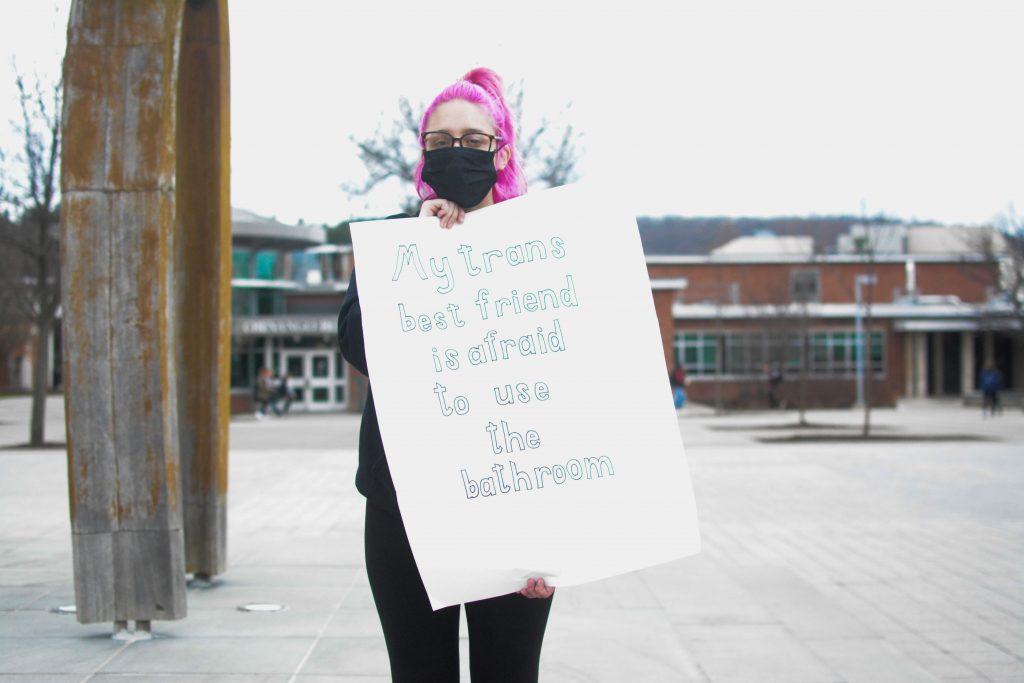While some students were walking to class, five students wearing black surgical masks stood in silence on the Spine, holding posters and notes as part of the Q Center’s Day of Silence protest on Friday afternoon.
When some students tried walking up to one of the five protesters, a small note was handed out.
“Please understand why I am not speaking today,” the note read. “I am participating in a Day of Silence, a national youth movement bringing attention to the silence faced by the LGBTQ+ community.”
The Day of Silence, a movement where participants refuse to speak during the day to highlight the silencing of the LGBTQ community, is an annual protest at Binghamton University held by volunteers who stay silent to show solidarity with people who can’t openly discuss their LGBTQ identity. Luis Santiago, a programming intern at the Q Center and a junior majoring in biochemistry, organized this year’s protest and said it was meant to catch people off guard and make them think about the discrimination the community faces.
“It isn’t really meant to be the changing action but to get people thinking,” Santiago said. “When people see the masks or duct tape, and start asking questions, that’s when people are getting to think about the people affected by discrimination.”
However, Santiago also said the silence can sometimes lead to people ignoring the protest altogether.
“Some of the main challenges is that people may just see the masks or any demonstration and just not know what it’s for or ignore it completely,” Santiago said. “The silence aspect requires people to be curious in their own nature and ask questions themselves rather than others asking or telling them.”
To help passersby understand the point of the protest, those who participated stood at different parts of the Spine holding posters that stated different forms of discrimination members of the LGBTQ community faced. Marissa Cimmino, a junior majoring in integrative neuroscience, held a poster that read, “I’m afraid to go to my own doctor.”
“I am transgender, so for me going to a doctor could be a scary experience,” Cimmino said. “They might not understand what it means to be transgender or misgender me. I feel that it is important to show and empower the voices of queer individuals. The campus does have a lot of resources and organizations focused on LGBTQ lives, but I don’t think everyone on campus is aware of them.”
Demonstrators also moved the location of the protest in an effort to reach more students. Previously, the demonstration was held in the University Union or Glenn G. Bartle Library, but this year, it was held outdoors.
“The issue I tried to focus on was people avoiding the protest or trying to ignore it,” Santiago said. “I wanted it to be as in people’s face as possible without necessarily interfering with classes and stuff. The Spine seemed perfect to intersect [with] a lot of people’s commute around campus and to see visitors who don’t go to Binghamton.”
The move comes after last year’s protest, when University tour guides avoided taking their tours through the Tillman Lobby after one guide messaged others in a GroupMe chat, suggesting they avoid the location because of the demonstration. Santiago said this was also a factor in his decision to move the demonstration outside — it would be in a place where nobody could avoid it.
“We heard that tour guides were told to avoid the protest last year in the Tillman Lobby while they were giving tours,” Santiago said. “I don’t know why they were told to do this, but this was part of the reason I also did it on the Spine, because I felt that it should be unavoidable and that people, both in this school and not in the school, should be more aware of discrimination in the community.”
Throughout the protest, students passing by the Spine occasionally stopped to read the posters, asking questions and prompting protesters to hand them a note with an explanation about the Day of Silence. George Guerra, a freshman majoring in political science, said he came to the protest after class in an act of solidarity.
“I’m hoping that this can bring light to the everyday, minor discriminations that LGBTQ people face,” Guerra said. “It might be little things, but it really does affect you.”



